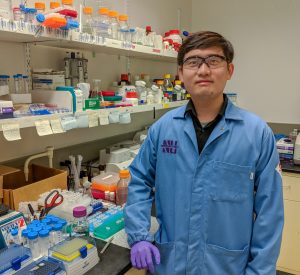Nanotechnology at Northwestern
Meet Wenjie Zhou, a student in Chad Mirkin’s group
April 12, 2019
How did you become interested in nanotechnology?
I can still recall my amazement when I was little and came across the news about superhydrophobic materials created by micro-tips. I was dazzled by the capability of material scientists to “magically” manipulate matter at a scale that we would never see in our daily lives, and by the fact that really small features can make a huge difference. Ever since then, becoming an architect at the nanoscale has been my dream.
How do you explain what you study to friends and family that don’t know anything about nanotechnology?
I make complex structures using building blocks that are more than 1,000 times smaller than the diameter of human hairs in order to create functional materials to change light that shines on/passes through them.
What are some potential applications for your work?
An immediately relevant application of the metamaterial study that I have been working on would be flat lenses—lenses that can focus light, but without curvature. Tangentially speaking, the ability to build materials using well-defined nanoparticle building blocks with different size, shape, and composition would enable a deeper understanding of structure-function relationships of metamaterials, which have high potentials in fields such as sensors and medical devices.
What are some of your interests outside of the lab?
As a computer hardware enthusiast, I enjoy building (and sometimes fixing) my computers and keyboards. Having full control of all the day-to-day tools not only gives you a sense of accomplishment, but also largely improves the efficiency of life.
Have you had any experiences with mentors while at Northwestern?
I had the privilege to be mentored by Qingyuan Lin, who was a former Mirkin group member, a Ryan fellow, and the lead author of the Science paper “Building superlattices from individual nanoparticles via template-confined DNA-mediated assembly.” Qingyuan was an extremely helpful mentor in both research and life. As a nanoscience researcher with great accomplishments, he is professional, creative, and a fantastic hypothesis-driven problem-solver. Although life was busy, especially for him, he was always well-organized and prepared to answer any of my last-minute questions. I was amazed that besides his impressive academic achievements, he also managed a perfect balance between research and family.
